
COMMON SENSE
 AND
AND
RIGHTS OF MAN
Bold-faced thoughts on revolution,
reason, and personal freedom
Thomas Paine
Edited by Laura Ross

STERLING, and the Sterling logo are registered trademarks of
Sterling Publishing Co., Inc.
Library of Congress Cataloging-in-Publication Data Available
10 9 8 7 6 5 4 3 2 1
Published by Sterling Publishing Co., Inc.
387 Park Avenue South, New York, NY 10016
2011 by Sterling Publishing Co., Inc.
Distributed in Canada by Sterling Publishing
c/o Canadian Manda Group, 165 Dufferin Street
Toronto, Ontario, Canada M6K 3H6
Distributed in the United Kingdom by GMC Distribution Services
Castle Place, 166 High Street, Lewes, East Sussex, England BN7 1XU
Distributed in Australia by Capricorn Link (Australia) Pty. Ltd.
P.O. Box 704, Windsor, NSW 2756, Australia
Design by Brenda Gates
Printed in China
All rights reserved
Sterling ISBN 978-1-4027-7867-4
For information about custom editions, special sales, premium and
corporate purchases, please contact Sterling Special Sales Department
at 800-805-5489 or specialsales@sterlingpublishing.com.
CONTENTS


H ow far can our passions take us? In Thomas Paines case, quite far.
Born in Thetford, England, in 1737, Paine took a while to find his mission in life. He left school at age twelve, ran away from home several times, tried and failed at various professions including corset-making, teaching English, and collecting taxes. At one point, he even joined the crew of a privateer in search of bounty. As he traveled around looking for meaningful occupation, Paine was forming indelible views on life and politics that would inform his later work. He married twice but spent most of his adult life on his own and in more or less straitened circumstances, declaring bankruptcy in early 1774.
Throughout some 37 years of trial and error, Paine found himself deeply and constantly embroiled in political conversation and he thrived on it as if it were food. Though hed had little formal education, he was insatiably curious, attending lectures and discussions on all manner of topics, feeding his passions for politics and science any way he could. A chance meeting with Benjamin Franklin during a visit to London would change his life forever. Franklin became a friend and mentor, drawing Paine into his circle of political reformers and radicals and convincing him to move to America in November of 1774.
Paine settled in Philadelphia and soon became the editor of a new monthly publication, Pennsylvania Magazine. It was there that he found his voice as a writer, producing dozens of pseudonymous articles on such highly charged topics as womens rights and the abolition of slavery. But it was the 1775 Battle of Lexington that galvanized Paine to write a larger work defending American liberty. His first draft of Common Sense (initially called Plain Truth) was completed by the end of that year and published anonymously in February of 1776.
As youll see, this brief, powerful essay is a ringing denunciation of corrupt monarchies, an eloquent defense of individual freedom, and a call for revolution. It was an immediate sensation Americas first bestseller. It was Paines intention to speak in everyday language to common people, to persuade them of their basic human rights and vast potential. We have it in our power to begin the world over again, he wrote. Many of his staunchest supporters (including John Adams and Franklins son William, the governor of New Jersey) felt that Paine had gone too farbut George Washington praised the works sound doctrine and unanswerable reasoning. Editions were published in French, German, and Danish, and in a short time, some 500,000 copies were sold.
It was as if Paine single-handedly turned the political tide in America and the rest, as they say, is history. During the war he helped inspire, Paine joined the military as secretary to a succession of generals, ultimately working for General Washington himself. By the time the war ended, hed written a dozen more essays and had coined the name United States of America.
In 1787, a financially strapped Paine left America for France, hoping to find backers for a new bridge design hed come up with. (Not unlike Thomas Jefferson and Benjamin Franklin, Paine was an inventor, as well as a philosopher and writer.) The project never came to fruition, but the people he met there and on trips to England would inspire his next important work, Rights of Man.
The first part of this work, published in 1791, is a fiery condemnation of the writings of Edmund Burke, a former friend with whom he broke ranks over the French Revolution. While Burke had defended tradition, the church, and the aristocracy, Paine believed in innovation, free thought, and democracy. The second part, published a year later, is somewhat more reasoned in its tone but continues to explore and defend Paines bedrock beliefs and excoriate those of Burke. In retrospect, the rhetoric of Common Sense was tame compared to that of Rights of Man.
Paine made many enemies because of his unwavering standards, pungent language, and penchant for personal attack. He was ultimately arrested in France for being English (though he considered himself American) and for not supporting the very revolutionaries hed glorified because he wouldnt endorse their decision to execute Louis XVI and Marie Antoinette. He was imprisoned for more than a year and barely escaped beheading, before the Reign of Terror abruptly ended with the execution of Robespierre in July of 1794.
It was Thomas Jefferson, one of the few important allies Paine had left, who brought him back to America in 1802but by the time he arrived he was in frail health. He lived out his years in poverty, dying in 1809 at the home of a friend in New York City, marginalized and out of favor in spite of the fact that his writings inspired two of the most important revolutions in human history.
So... how far can our passions take us? Paine never managed to amass wealth, nor was he elected to office. Yet, through the power of his writing, his common sense, and the strength of his moral example, he moved nations as well as individual hearts. His work is an enduring inspiration for all of us who endeavor to make our voices heard in small or large ways.
If one individual can change the course of history, imagine what each of us can do within our own spheresour families, workplaces, and communitiesto inspire and influence others. As you read through this edition of Common Sense and Rights of Man, pay particular attention to the highlighted passages and think about how Paines words, written so many years ago, still resonate today. It is quite impressive that what must have seemed bracingly radical when it was written still has the power to captivate and galvanize us more than 200 years later. The For Further Thought sections at the end of each chapter ask you to think and write about many of the themes and ideas found in Paines workseverything from the nature of dissent, debate, and freedom to the relationship between the personal and the political.
Next page
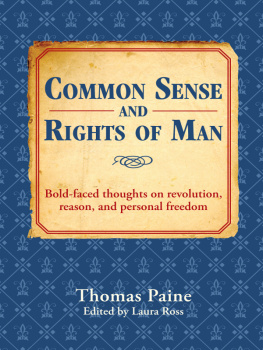
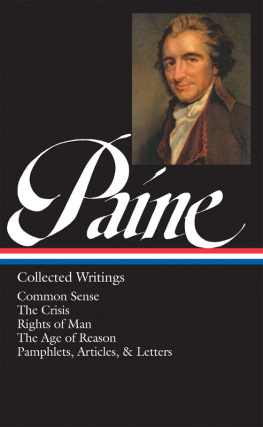
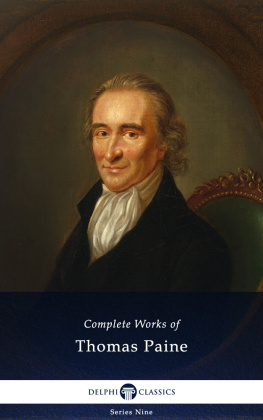

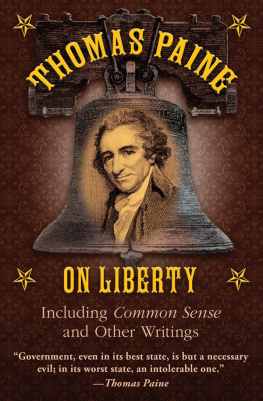
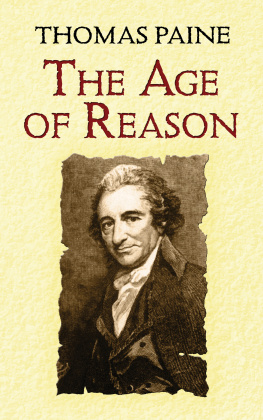
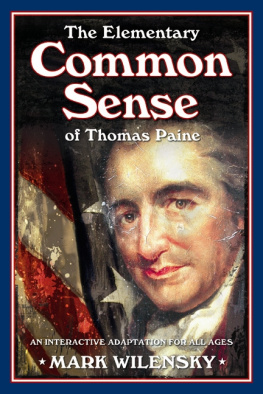

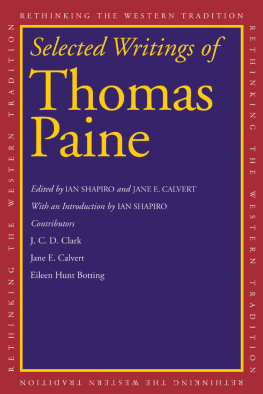

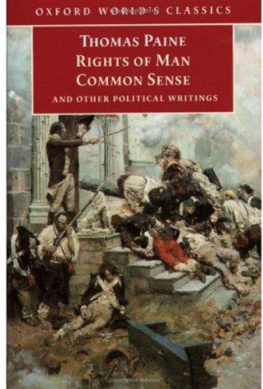
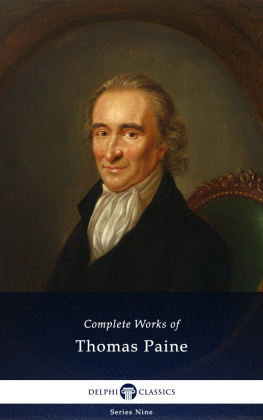


 AND
AND

